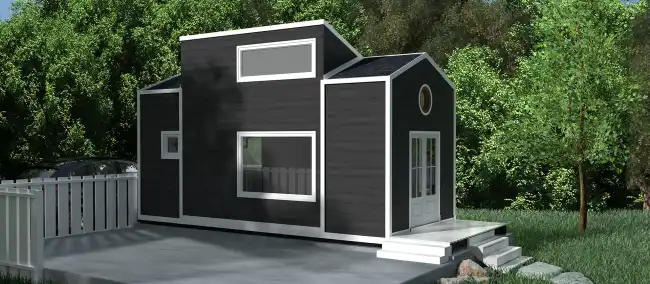
Pros & Cons About a Tiny Home
Oct 18, 2023
In a world where "bigger is better" has been a prevailing mantra for decades, a new trend has emerged that challenges this notion head-on: the tiny home movement. These pint-sized dwellings have been capturing the imagination of homeowners, architects, and sustainability enthusiasts alike, offering a unique and minimalist approach to living. But are they worth it? We’re breaking down the pros and cons so you can weigh their advantages and challenges.

Pros of a Tiny Home
1. Cost Effective - Great Starter Home
Traditional homes come with hefty price tags, including mortgages, property taxes, utilities, and maintenance costs. In contrast, tiny homes are significantly more affordable, both in terms of initial purchase price and ongoing expenses.
- Affordable Entry Point: Tiny homes cost significantly less than traditional homes.
- Minimal Utility Bills: Smaller spaces require less heating, cooling, and electricity.
- Lower Maintenance Costs: Less square footage means fewer repairs and upkeep.
- Debt Reduction: Free up income to pay off other debts, such as student loans.
2. Easy to Move
Tiny homes offer a unique sense of mobility and flexibility. They allow homeowners to relocate with ease, embrace a nomadic lifestyle, or adapt to life changes without major disruptions.
3. Faster Everything
Tiny homes are built faster, processed faster, and zoning approvals are often more streamlined. This makes them an ideal solution for those on a tight timeline.
4. Easy to Clean
Less space means less cleaning. With fewer surfaces to maintain, homeowners can enjoy a clutter-free, low-maintenance lifestyle.
5. Environmentally Friendly
Tiny homes have a smaller environmental footprint:
- Reduced Resource Consumption: Fewer materials are needed for construction.
- Energy Efficiency: Smaller homes require less heating and cooling.
- Lower Emissions: Reduced energy usage leads to fewer carbon emissions.
- Less Land Impact: Requires less space, leaving more land untouched.
- Encourages Minimalism: Promotes sustainable, low-consumption living.
Cons of a Tiny Home
1. Less Space
Tiny homes offer limited storage and living space, which can be challenging for multi-member households. Downsizing possessions and adapting to minimal space is a significant adjustment.
2. Gets Dirty Easier
Since tiny homes have less space, they tend to get messy more quickly. More frequent cleaning is required to maintain a tidy, comfortable environment.
3. Legal Grey Areas
Zoning and building codes are not always friendly to tiny homes. Many municipalities have yet to adapt regulations to accommodate them, making it difficult to find legally approved locations.
Final Thoughts
The tiny home lifestyle comes with both advantages and challenges. On the one hand, they offer affordability, mobility, and sustainability. On the other, they require lifestyle adjustments, have limited space, and face legal uncertainties. If you value simplicity and minimalism, a tiny home might be the perfect fit. But if you need more space and stability, it may not be the best long-term option.
